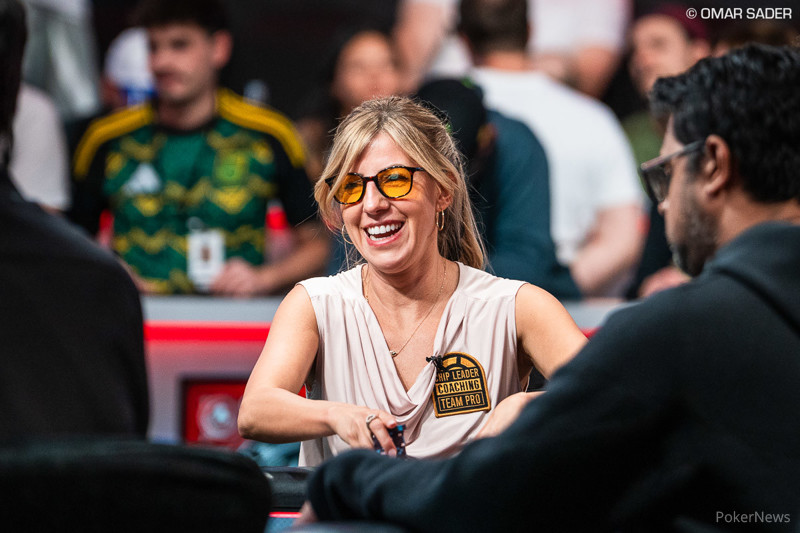With the flood of cheating allegations in recent weeks, the high-stakes poker world may be at the start of its own #metoo movement where people who have cheated, or who have been cheated, are coming forward in droves to share their stories of players at the top of the poker world engaging in unethical behavior.
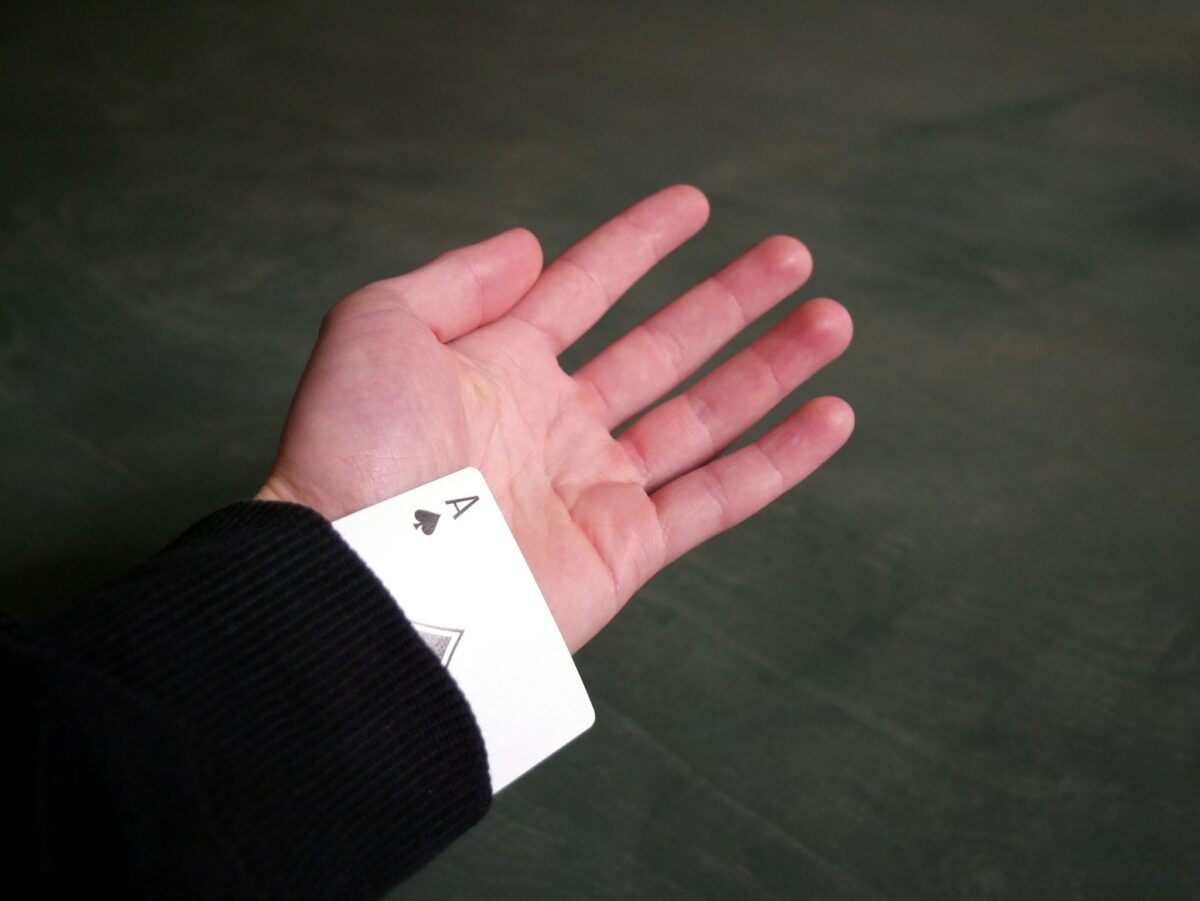
Many players appear to have made millions in ways they would rather the world not know about.
So how common is cheating in the high-stakes poker world? Let’s start with what we know for sure. Then I’ll speculate a bit about some things I’ve learned and what they make me suspect.
Real-Time Analyzers change the game
We know that all the major poker sites have banned players for using Real Time Analyzers or RTAs. An RTA is loosely defined as software that helps you play online by analyzing the hand and finding the best play based on a solver or a database of pre-solved hands. Because solvers take too long to analyze a hand in real-time, 20 minutes on even the fastest computer, a database of pre-solved hands is the only way to use a solver while playing.
GGPoker announced in September 2020 that it confiscated more than $1 million of player funds and banned 40 accounts for RTA use, while America’s Cardroom launched an initiative to stop RTA and bot use last year. The Winning Poker Network, which hosts America Cardroom, even published a list of the banned accounts, though they appear to have stopped adding names to the list in March 2021. We aren’t sure if they stopped banning players at the time or simply stopped publishing the account names.
We also know that over the years players have been banned for collusion and multi-accounting, which is the practice of playing more than one account either to get more entries into a tournament, or to hide the player’s identity to get an advantage over other players who may expect a different style of play because of the new screen name.
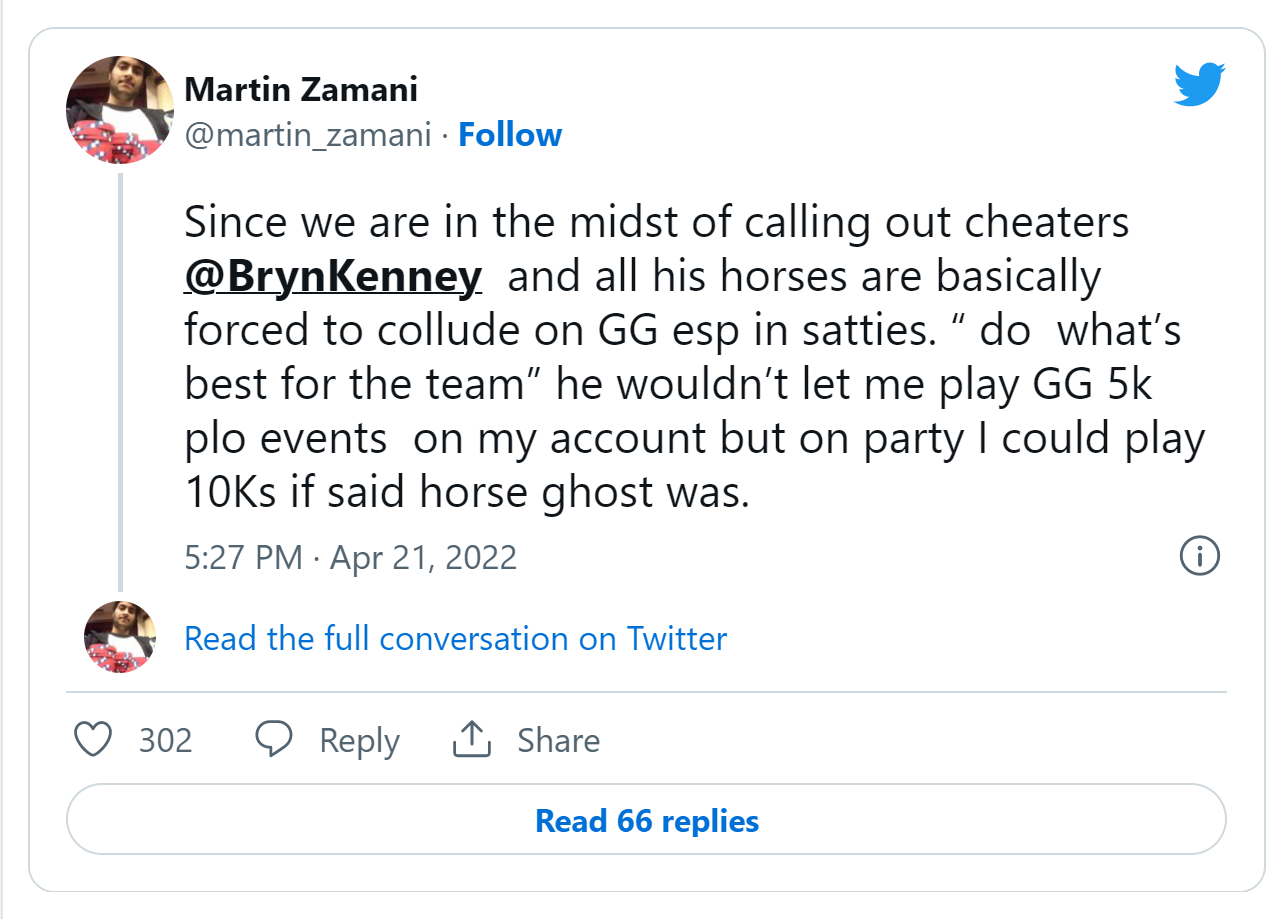
Bots, programs that play poker online, have been a problem for years, but in the early days they weren’t good enough to play well. Now they can be hooked up to a database of solver solutions and play very well, so online poker sites are cracking down as best they can.
We also know that there are ways around all of the measures sites are taking to crack down on cheating, and that clever programmers are finding new ones every day. Programming knowledge isn’t even necessary to use RTA software if done in what I believe is the most common method — using two separate machines.
German poker pro Fedor Kruse was accused of using two machines in September 2020 — by the poker players who lived with him. In a post on the Two Plus Two forum, Kruse’s roommates said they wouldn’t tolerate cheating and warned him he would have to move out of the apartment if he didn’t stop using his “dream machine” setup, which consisted of two computers, one for playing and one on which he ran RTA software.
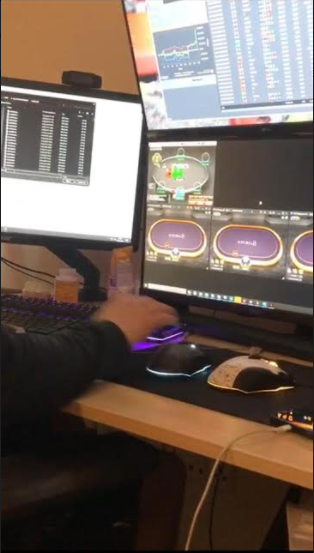
Doing what Kruse did — using a machine that’s not hooked up to the poker room software in any way — is much tougher to detect. While the larger card rooms are working on ways to detect this behavior, it’s still occurring on smaller sites that simply don’t have the resources to catch those who are doing it.
RTA suspicions
While investigating cheating over the past six months, I’ve become certain of all kinds of nefarious behavior. Much of it I can’t prove, so naming names doesn’t work in most cases. But those names aren’t hard to figure out with a few Google searches. If someone is constantly associated with people who are known cheats, if they’re playing games where there is likely to be cheating, and they’re still winning, then it’s safe to assume they aren’t playing fair.
I’ve also heard countless stories from people who play in these big games. Sources I trust have told me that they believe a significant fraction of the players in tournaments bigger than $50 online are using some sort of RTA software. Some of these sources have even said they think that number is more than half, with the cheaters usually playing multiple accounts and filling far more seats than the players who are playing fair.
I’ve learned that most of the “invite only” private app games that play bigger than $10/25 are a big risk, and cheating is the standard in many of the biggest games played on less secure apps. I’ve even seen screenshots of botsat work:
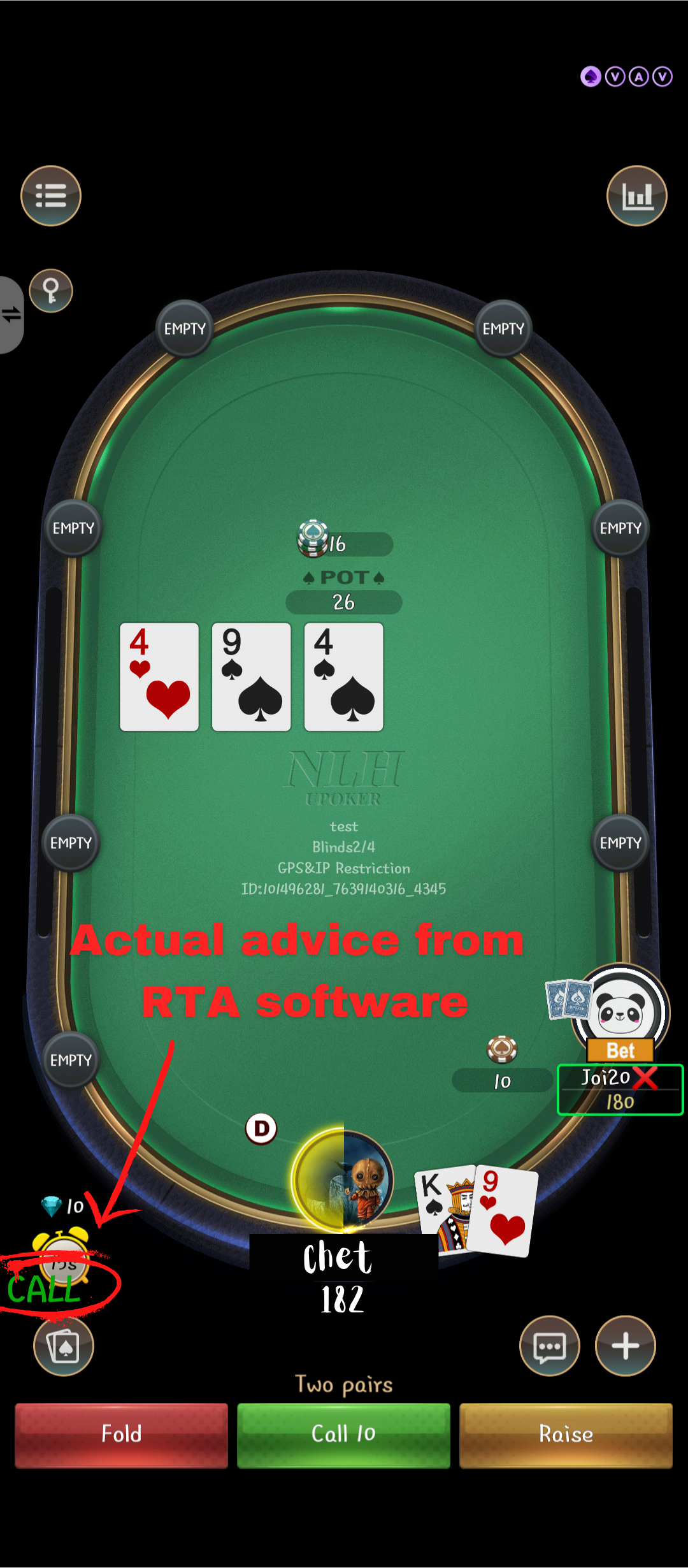
Publicly available bots generally don’t play well enough to beat high-stakes games, but if a bot can work on the app, it’s a certainty that someone has figured out how to hook that bot up to a database of pre-solved solutions and let it grind away. And those people are smart enough to keep knowledge of the bot away from people like me who would out them for using it.
Cheaters cheating cheaters?
I talked to a number of different people who played in a $20/40 No-Limit game on a private app recently. From the different viewpoints and other information, including some screenshots, I was able to piece together the story of a really terrible game. This was the lineup in the game on a Saturday night a few months ago.
Seat 1 – A world-class No-Limit player who was sharing card info with another strong player (Seat 4), who was in the same hotel room.
Seat 2 – A world-class No-Limit player who was playing under the account of a whale (a wealthy recreational player) who everyone expected to play badly. This player was backing Seat 3, but I don’t know for sure they were working together.
Seat 3 – A strong player who is backed by Seat 2 playing under the account of another recreational player known to be very soft.
Seat 4 – A strong pro sharing cards with Seat 1.
Seat 5 – A pro using an RTA database in real-time.
Seat 6 – One of the best No-Limit players in the world.
Seat 7 – A pro using an RTA database in real-time.
Seat 8 – The game’s host, who was both using an RTA database and receiving the rake from the game and kickbacks from the winners.
The fun part? The cheaters had no idea about most of the other cheating players and no one could figure out why they weren’t crushing the game. They were all cheating each other in various ways, with only Seat 6 playing the game straight, and he plays so well that he didn’t lose much money even while he was being cheated.
Why can’t I reveal the names of these players? Well, I was close to doing just that…
I wish I could have found the proof that would be required to put these names in print as a journalist, but everyone involved would only speak off the record because they didn’t want to be blackballed or implicate themselves in a scandal. In fact, this is why a revelation like we saw from Martin Zamani last week is so rare.
If Fedor Kruse had simply had his own apartment, we might never have known what he was doing. The same would be true if his housemates decided to join him and make some extra money instead of outing him on a public forum. Think of how many people either have their own place, have friends who are cheaters too, or recruit the people who catch them successfully rather than being outed. There are even more players who know about this stuff, but who won’t talk about it because they don’t want to get involved or don’t want to be shunned by a group of friends.
Why cheating in online poker usually goes undetected
The first reason that most online cheating goes undetected is because people who do it usually are smart enough to stay under the radar. If it seems like every criminal you see on TV was really bad at being a criminal, that’s because those are the ones who get caught. The smart ones rarely suffer any consequences of their actions.

The second reason is that many online poker sites aren’t incentivized to catch cheats. Cheating players tend to play many accounts and generate mountains of rake, and there’s a race to the top when it comes to online poker sites. If you have enough traffic, it snowballs as players realize that the game they want to play is available all of the time. Check a few sites for Sit & Go traffic to see this in action. You’ll find that below a certain number of players, Sit & Go tournaments just don’t have enough players to run at all, while sites just above that number have them running regularly.
If a site that isn’t working so hard at catching cheats is able to reach that critical mass because of all those extra bots and multi-accounters, and the site that is enforcing fair play doesn’t, it means that the site allowing cheaters thrives and fair play is left in the dust.
The third reason that cheaters aren’t caught more often is that the money involved can be huge. And most people in the high-stakes poker world are heavily motivated by money. When a high-stakes player finds out another player is cheating, how often will they call them out? Frequently, they just ask for a cut or learn how to do the same thing themselves. And even if they don’t join in the scam, they usually say nothing, not wanting to be the person to rock the boat.
I’m certain that many of the most famous players in poker are doing exactly this. In particular, those playing a high volume online at the highest stakes. Those who I don’t think are involved in this kind of behavior tend to avoid those games these days because they know they aren’t straight.
This is how I formed a basic feel for those players who I think aren’t cheating; they tend to play live tournaments and cash games, don’t play nosebleed stakes online unless it’s heads-up, and don’t play with those who I have on a list of players I think are cheating. They also tend not to back, or to be backed, by the players I suspect of cheating.
When I followed the list of players who appear to be less than ethical, I found them running together in packs, and didn’t find much crossover in friendships between them and the players who appear to be honest. If there was a crossover, it usually involved a less ethical player backing the more ethical player because even some of the best players go broke.
For cheaters, cash is king
I learned a lot about the money flow in the poker world as well. Sadly, it seems that the cheaters often make enough money that they can afford to back others who go broke, sometimes drawing them across the line and into a world of shady and predatory behavior. That’s what Martin Zamani claims happened to him when he accepted backing from Bryn Kenney. Zamani’s story isn’t the first I’ve heard about a player who was drawn into a stable of cheaters this way. In fact, it seems common.
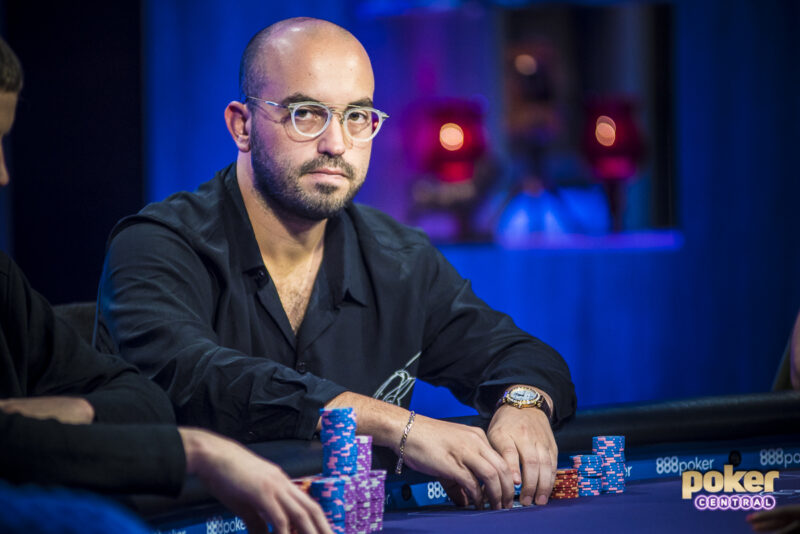
So the bad news is that lots of people cheat in online games and the problem isn’t going away anytime soon. A number of sites will do what they can, but they won’t catch everyone. And the money is too big for the cheaters to pass up just because the sites make their lives a little harder.
RTA software will get more powerful and harder to detect. Collusion will always be a problem. And there will always be more broke poker players who are willing to let someone else use their account or play for them when they run deep in a tournament.
The good news is that the scope and scale of online cheating is coming out into the open. This will forewarn some of the players who might be pulled into the circle of cheats, and may convince a few current cheaters that it isn’t worth the risk. More important, those who are being cheated — mostly high-stakes players online — will at least have some idea of what they’re getting into when they play these games.
Where will these revelations take us? How will they affect the game? Well, #metoo changed the game by changing the conversation, and I expect a similar reckoning will happen with poker. Eventually.
Things aren’t perfect, but in many circles, especially in Hollywood, bad behavior has finally been called out, perpetrators were punished, and attitudes toward women in the workplace have changed significantly.
If poker players can continue to call out all cheats when we see them, we can make real progress. We may never clean up the game completely, but we can make a difference.
Meanwhile, I’ll continue to investigate, looking for proof about what I know or strongly suspect.
If you have information about unethical behavior, please feel free to contact me, especially if you can go on the record or have information I can publicly verify. Email me at blindstraddle@gmail.com or DM me on Twitter @foxpokerfox.
I’m also amassing a huge database of online poker hand histories. If you have information or a large sample of high-stakes hand histories, send it over and I’ll see what I can do with it. If you’re a whistleblower who wants to come forward, feel free to contact me and I’ll be happy to help you figure out how best to get the word out and prove your allegations.
